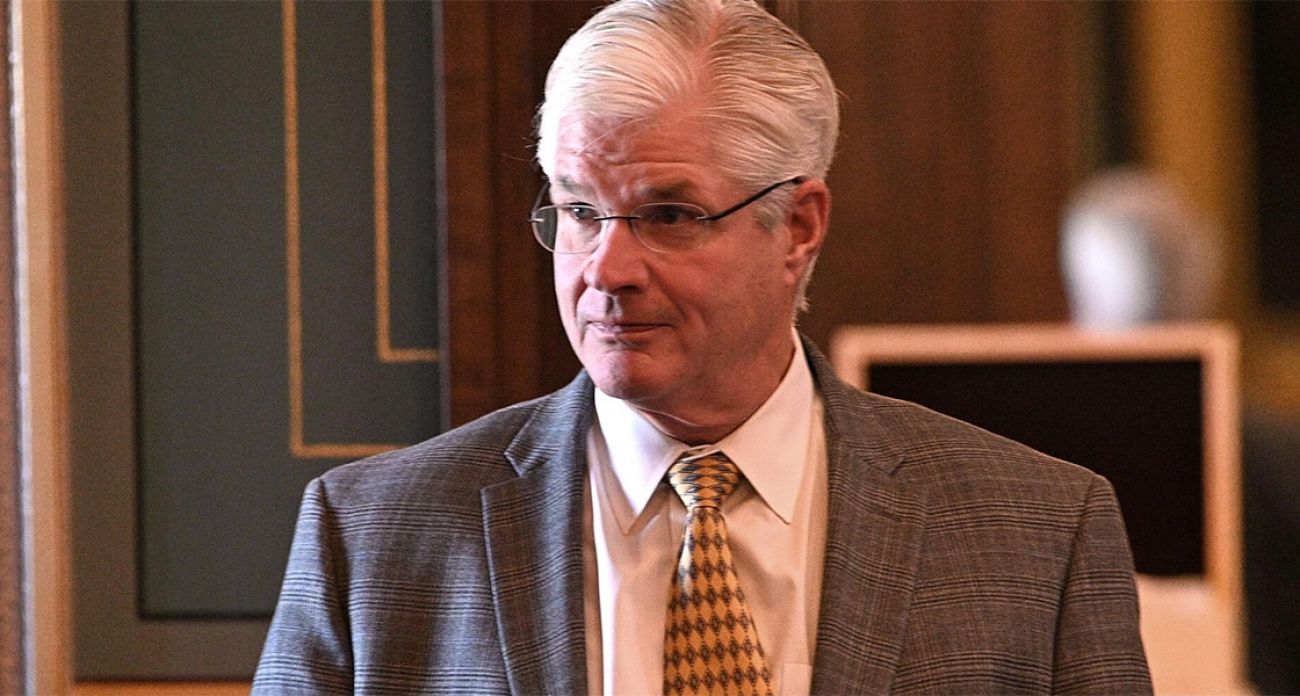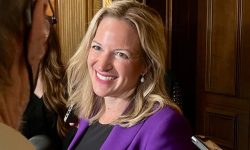GOP leader: No mask mandates, Michigan needs to learn to live with coronavirus

Oct. 21: Michigan business leaders urge Whitmer and Republicans to unite on COVID
Update: Health experts to Shirkey: COVID herd immunity would kill 30K in Michigan
LANSING — Michigan’s Republican-led Legislature will work with Democratic Gov. Gretchen Whitmer to continue some COVID-19 safeguards, but mask mandates and business regulations are likely on the chopping block following a state Supreme Court ruling that upended Whitmer’s emergency power, Senate Majority Leader Mike Shirkey said Saturday.
Shirkey and other Senate Republicans met by Zoom early Saturday as they and their legal counsel assessed the impact of the late Friday ruling that found unconstitutional a 1945 law Whitmer has used to repeatedly extend a state of emergency without legislative approval.
- Michigan coronavirus unemployment, map, curve, COVID-19 updates
- Dashboard: Michigan coronavirus testing numbers, trends, COVID-19 data
- Michigan Supreme Court rules Whitmer lacks COVID-19 emergency powers
Shirkey told Bridge he expects a federal court could act on the decision and begin to invalidate Whitmer executive orders as soon as next week. The governor has claimed that cannot happen for at least 21 days under Supreme Court rules.
"Technically, the executive orders are still in place, [but] I don't know that anybody's going to enforce them,” Shirkey said. “If you're a gambling man, if you're talking handicapping, it's likely that most of them, if not all, will be terminated."
Friday’s ruling, which came in response to questions from a federal judge, capped months of verbal and legal jousting over the governor’s executive authority, which GOP lawmakers challenged in a separate case that remains before the Michigan Supreme Court.
Because Whitmer no longer has legal authority to extend a state of emergency unilaterally, Republicans contend she will now have to work with them to craft bipartisan policies to address the ongoing pandemic. But they’ll likely begin the process far apart.
Shirkey, who said he’s reached out to Whitmer to try and set up a meeting for next week, told Bridge he thinks it’s time to stop treating COVID-19 like a public health emergency. The virus has infected more than 126,000 state residents and killed nearly 6,800, but its rate of growth has slowed in much of the state.
"We need to now transition from a public health emergency to managing and learning to live with this virus," he said. "I think we can do that without being under a state of emergency, and that's my strong, strong feelings."
Whitmer has given no indication she plans to work with the Legislature on the state’s COVID-19 response. In a Friday night statement, she claimed the ruling does not take effect for at least 21 days, an apparent reference to Supreme Court rules that give parties three weeks to file a motion for reconsideration, which are typically rejected summarily.
Related:
- Confusion reigns in Michigan over masks, business rules after COVID ruling
- COVID masks can still be required in Michigan schools, despite ruling
- Coronavirus powers ruling puts spotlight on Michigan Supreme Court election
- Nessel won’t enforce Michigan Gov. Whitmer’s COVID orders after court ruling
After that, the governor said, “many of the responsive measures I have put in place to control the spread of the virus will continue under alternative sources of authority that were not at issue in today’s ruling.”
Whitmer did not elaborate, but legal experts say Michigan’s public health code also gives Michigan Department of Health and Human Services Director Robert Gordon authority to respond to epidemics, including the ability to “prohibit the gathering of people for any purpose and … establish procedures … to ensure continuation of essential public health services and enforcement of health laws.”
Gordon has issued 19 epidemic orders since March, some of which reinforce Whitmer’s executive orders, including her mask mandate, workplace safety rules and “safe start” plan that outlines her overall regulatory response to COVID-19.
Shirkey said the Senate GOP legal counsel was reviewing those orders as of Saturday morning, but "I don't think they have the same latitude as what the governor was exercising under executive orders," he told Bridge.
"I was a little disappointed that that was the default" response from the governor, as opposed to a pledge to work with the Legislature, Shirkey said. "The Supreme Court really affirmed that balance of powers means balance of powers."
Asked if Whitmer planned to meet with GOP leaders next week, spokesperson Tiffany Brown said Saturday morning that the governor’s office was still “reviewing the decision and what it means for next steps, so no definite updates to share just yet.”
No ‘appetite’ for mask mandate
Shirkey, however, is operating under the assumption the Legislature will be in for a heavy lift this fall. While the Senate is scheduled to meet only eight times across October and November, the majority leader said he’s already told members to “re-evaluate their calendars for the rest of the year” and be prepared for some “short-notice session days.”
For lawmakers, "the next step is for us to go through all the nearly 200 executive orders” that Whitmer has issued since March and “prioritize those” that may warrant codification, Shirkey said. Senate Republicans are interested in working with the governor to continue temporary unemployment insurance expansions, he told Bridge.
"People would want [some of the executive orders] to go away, maybe even a majority of them, but there are some like the unemployment insurance that deserves the full legislative process attention,” Shirkey said.
If the health department’s order does not stand up, Republicans are unlikely to extend Whitmer’s mask mandate, which requires most Michiganders to wear face masks at indoor public spaces and outdoors when they can’t socially distance.
Dr. Robert Redfield, the director of the U.S. Centers for Disease Control and Prevention, has called masks “the most important powerful public health tool we have” we have to fight COVID-19.
Shirkey is encouraging the public to wear masks, socially distance and wash hands, but noted he doubts there’s “any appetite” among Republicans for a mandate.
“We’re moving now from an era or a time when the focus was on mandating, dictating and frankly in some cases threatening, to more of an informing and inspiring and encouraging and loving and trusting people to do the right thing” approach, he said.
Shirkey said Republicans are also likely to scrutinize worker and workplace safety rules imposed by Whitmer, who is currently requiring companies to conduct employee health screenings each day, provide personal protection equipment and limit indoor capacity at restaurants, among other things.
Businesses "have no interest in putting their clients or their customers or their employees or their families at risk, and they'll now have the ability to make those kinds of judgements," Shirkey said.
"Freedom is messy," Shirkey said. "And I think for the most part, people do make the right decisions. You can never, ever, ever pass enough laws... to prevent people from making bad decisions. That's not the country that we love and embrace."
Can GOP work with Whitmer?
One challenge for Shirkey and House Speaker Lee Chatfield, R-Levering, could be to build a cooperative relationship with Whitmer after suing her, backing a petition drive to repeal her powers, lambasting her for imposing requirements on business and simultaneously accusing her of not doing enough to protect nursing home residents.
Michigan Supreme Court Justice Stephen Markman, writing for the 4-3 majority on Friday, made clear he hopes that will happen.
"Our decision leaves open many avenues for the Governor and Legislature to work together to address this challenge and we hope that this will take place," he wrote after declaring that “ the executive orders issued by the Governor in response to the COVID-19 pandemic now lack any basis under Michigan law."
Chatfield, in a Saturday morning statement, said he is “eager to partner with the administration to chart the state’s path forward.”
Whitmer and GOP leaders have managed to work past their differences before, and recently: In August, they struck a deal on a school restart plan, and last month they finalized a $62.8 billion state budget that both sides hailed as a major bipartisan achievement.
Those negotiations are "Exhibit A for what we can accomplish together when everybody is at the table in an equal partnership," Shirkey said.
But he acknowledged the process could be challenging: "It's always easy to be the opposition party," he said. "Governing is the hardest part to do. Now we have a serious responsibility. [Lawmakers are] looking forward to engaging and exercising the full breadth and robustness of the legislative process so that we're making good decisions together."
Republican President Donald Trump's COVID-19 diagnosis and Friday night hospitalization is a reminder that "nobody is immune" from the coronavirus, Shirkey said, but it does not change his belief that it is time to reassess Michigan’s response.
"Frankly, I was surprised that it took this long because in the job he has, and the number of people that he has to interact with, even if you're practicing the ultimate safety precautions, his exposure and his risk factors are high,” he said of Trump.
The Clarklake Republican challenged what he called a "lingering notion that we could, by restricting everything, basically ignore the fact that the COVID exists and delay everything for perpetuity. The virus ultimately was going to win, it was just going to take a longer time."
At least five Michigan lawmakers, including one who died, and two staffers have contracted the coronavirus since March -- perhaps more since the Republican leadership in the state House has not disclosed total case counts.
Democrats are calling for new workplace safety precautions at the Michigan Capitol, but a mask mandate is not going to happen in the Senate, Shirkey said, noting lawmakers are encouraged to wear a face mask in the upper chamber and often do.
"It's just not practical, and frankly it's against the Constitution, to deny a duly elected senator access to the Senate floor" because they won't wear a mask, Shirkey said.
"Our compliance has improved over time, and this gives us an opportunity now to set the example and demonstrate that we're serious about that."
See what new members are saying about why they donated to Bridge Michigan:
- “In order for this information to be accurate and unbiased it must be underwritten by its readers, not by special interests.” - Larry S.
- “Not many other media sources report on the topics Bridge does.” - Susan B.
- “Your journalism is outstanding and rare these days.” - Mark S.
If you want to ensure the future of nonpartisan, nonprofit Michigan journalism, please become a member today. You, too, will be asked why you donated and maybe we'll feature your quote next time!




